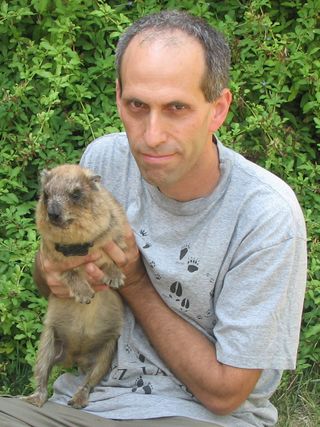Mathematics Key to Unlocking Mystery of Language?

This ScienceLives article was provided to LiveScience in partnership with the National Science Foundation.
To Arik Kershenbaum, the squeaks and whistles of dolphins and whales hold more than just a charming fascination, they could unlock the mysteries of how language evolves.
A postdoctoral researcher at the National Institute for Mathematical and Biological Synthesis, Kershenbaum uses mathematical techniques drawn from genetic analysis to examine how syntax in animal communication relates to behavior. Questions he is exploring include whether a dolphin learns vocalization patterns from other dolphins and what information about their surroundings the animals can put into their calls.
Kershenbaum, who previously developed signal processing algorithms for the aerospace industry in Israel, is applying techniques he first used in studying the vocalization patterns of the rock hyrax, a small mammal that lives in the Middle East and Africa.
Name: Arik Kershenbaum Age: 47 Institution: National Institute for Mathematical and Biological Synthesis Hometown: Yuvalim, in the Galilee of Israel Field of Study: Animal vocal communication
What inspired you to choose this field of study?
When I was little, I wanted to be a rocket scientist and a zoologist. What could be more exciting than talking to animals and investigating outer space? When I grew up, I spent 10 years working as a rocket scientist, and then changed fields so I could realize my second childhood dream. Childhood dreams are important — and it seems that you can make them come true if you really want.
Sign up for the Live Science daily newsletter now
Get the world’s most fascinating discoveries delivered straight to your inbox.
What is the best piece of advice you ever received?
"I dare do all that may become a man, Who dares do more, is none"
What was your first scientific experiment as a child?
I don't exactly remember what the aim of it was, but I think it had something to do with pouring acid all over the garden and causing untold damage.
What is your favorite thing about being a scientist or researcher?
There's that feeling that you're working on the "real thing." You're not learning from textbooks like in school or listening to lectures like in university. You're doing things no one has done before and finding out stuff no one else has ever known.
What is the most important characteristic a scientist must demonstrate in order to be an effective scientist?
Without a doubt, a deep fascination and desire to understand that little corner of the universe that you're investigating. Being brainy doesn't even matter that much. Most of us can be world experts at that one thing that really interests us.
What are the societal benefits of your research?
I never like to answer this question. I could say, "By understanding animal communication, we will understand the evolution of human language and maybe find a cure for autism." But that's not the right answer to give. The answer is that all knowledge benefits society. It may not give us more health, or money, or technical gadgets (today ... tomorrow it might ...), but it helps to fulfill us as human beings. Carl Sagan said, "An extraterrestrial being, scrutinizing what we mainly present to our children in television, movies, etc, might easily conclude that we are intent on teaching them murder, rape, cruelty, superstition, credulity and consumerism. What kind of society could we create if, instead, we drummed into them science and a sense of hope?" I don't think that we need any more reason to do science than that.
Who has had the most influence on your thinking as a researcher?
Probably Ron Lockley. "Who?" you ask. He was an English naturalist who wrote a fantastic book called, The Private Life of the Rabbit. This book inspired Richard Adams to write Watership Down, which was my favorite story as a child. In my first year at university, I found Lockley's book in a small book shop and was astounded how he used simple and careful observations of wild rabbit behavior, which lead to such a rich and profound understanding of their social relationships. I felt that it opened a window for me onto a different world and I've wanted to explore that world ever since.
What about your field or being a scientist do you think would surprise people first?
Half the people I meet are surprised that I do most of my work in front of a computer, without meeting a single animal. The other half see pictures of me putting radio collars on rock hyraxes, and are surprised that I actually pick these animals up. Sometimes it's the same people surprised at both ...
If you could only rescue one thing from your burning office, what would it be?
Let it burn. Knowledge, once uncovered, cannot be unlearned. Plus, I have everything backed up on the cloud. ;-)
What music do you play most often in your office or car?
I listen to everything from Mozart to the Sex Pistols, and plenty of R&B in between, but never when working. Perhaps because my work has too much in common with "music" in the widest sense — it only confuses me to hear human compositions when I'm trying to understand animal ones.
Editor's Note: The researchers depicted in ScienceLives articles have been supported by the National Science Foundation, the federal agency charged with funding basic research and education across all fields of science and engineering. Any opinions, findings, and conclusions or recommendations expressed in this material are those of the author and do not necessarily reflect the views of the National Science Foundation. See the ScienceLives archive.
Most Popular



